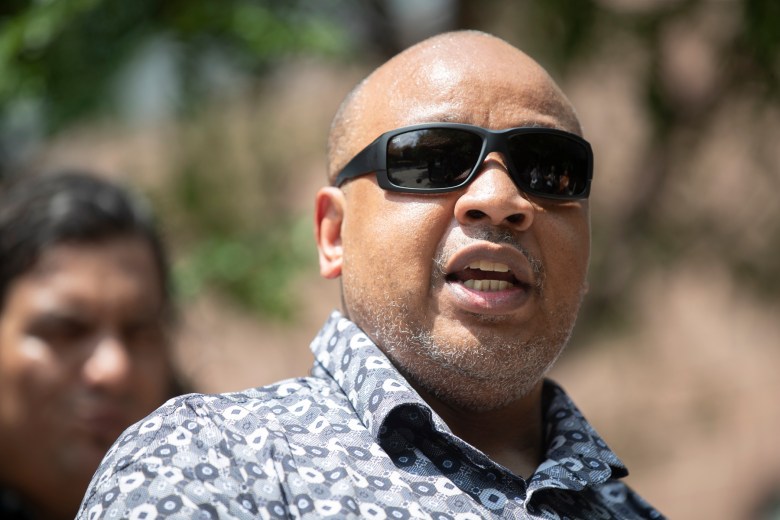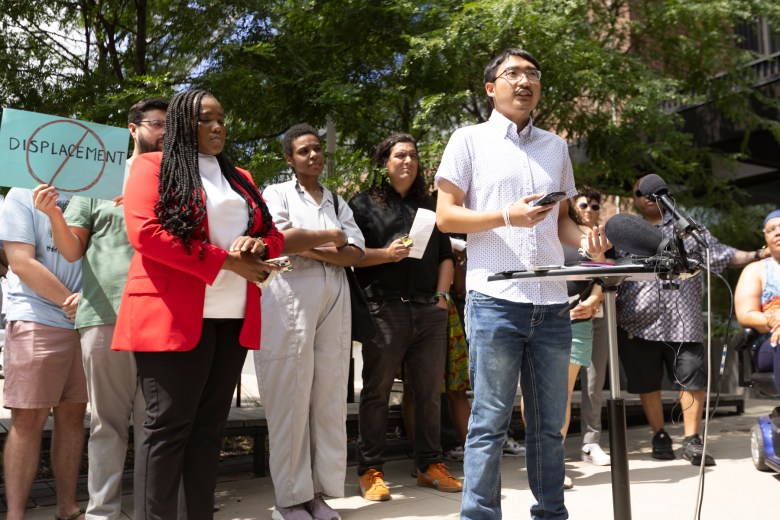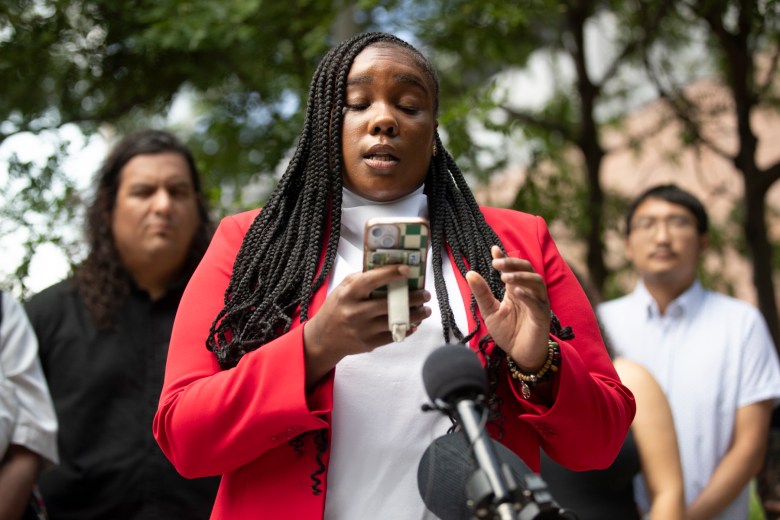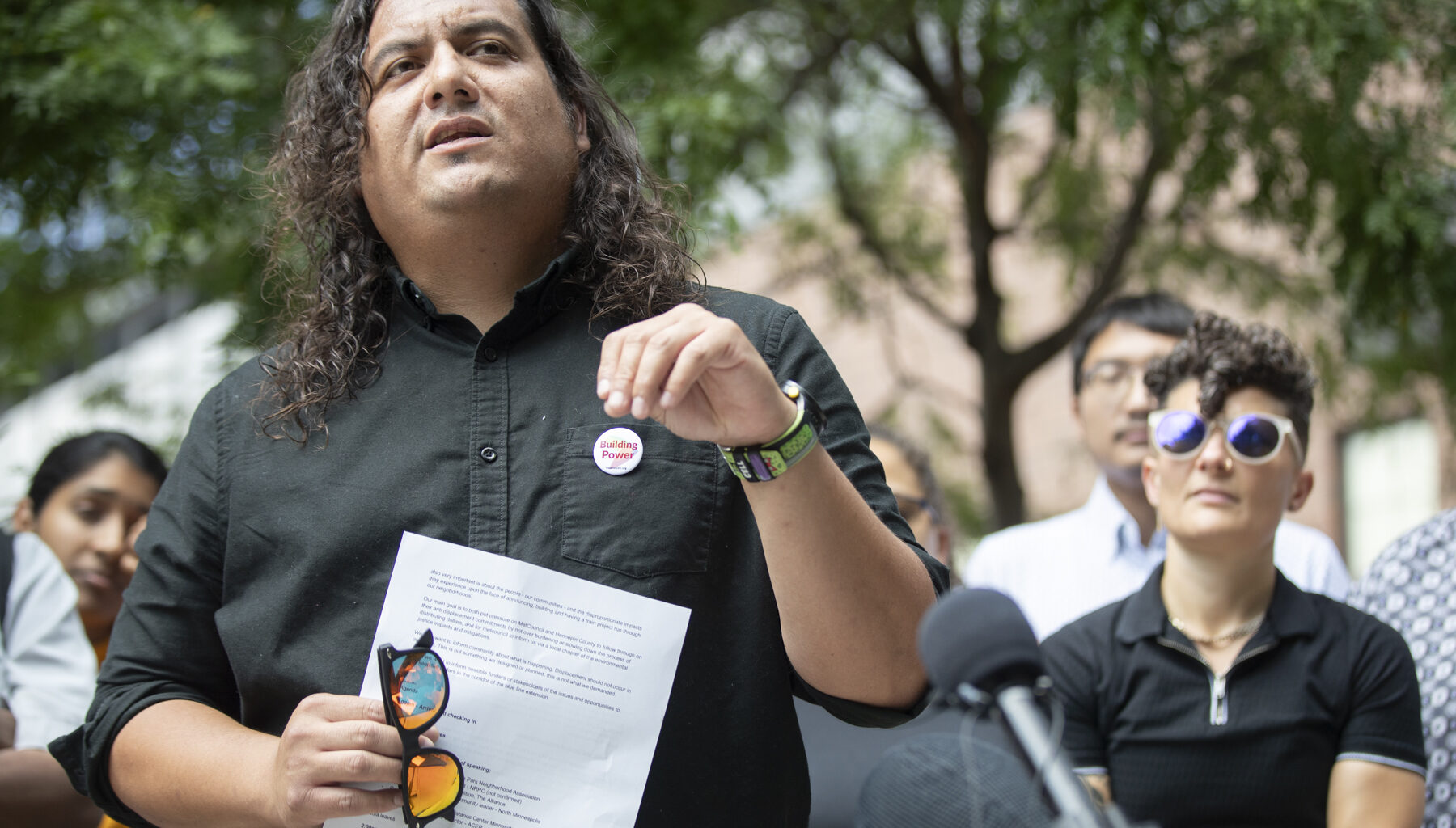Business owners and community members rallied outside Metro Transit headquarters on Thursday to protest recent changes they say will delay funding to those affected by Blue Line construction.
Work on the $3.2 billion Blue Line extension is expected to begin in 2027, bringing disruption to communities from north Minneapolis to Brooklyn Park.
Last year, the Legislature set aside $10 million in anti-displacement funds. But activists say new insurance and other requirements will make it much harder for community members and small businesses to access those funds.
They are also frustrated that a meeting with the Corridor Management Committee, which advises the Met Council on all issues related to the design and construction of the proposed rail line, was canceled.
More than a dozen Blue Line Coalition members and supporters spoke out against the Blue Line extension, but members said they understood it was still coming and instead boiled down their message to a simple: “It’s not about the train, it’s about the people,” chant.
 KB Brown, the owner of Wolfpack Promotions in north Minneapolis speaks at a press conference in front of the Metro Transit headquarters in Minneapolis on Aug 7, 2025. Credit: Chris Juhn for Sahan Journal
KB Brown, the owner of Wolfpack Promotions in north Minneapolis speaks at a press conference in front of the Metro Transit headquarters in Minneapolis on Aug 7, 2025. Credit: Chris Juhn for Sahan Journal
Since 2013, the Blue Line Coalition, a group of organizations advocating for community members along the train’s route, have argued that the Blue Line extension raises questions about racial justice and regional equity.
In 2024, the Legislature launched the Anti-Displacement Community Prosperity Program (ACPP) to pay for affordable housing, small business support, infrastructure, commercial development and job training and placement along the corridor.
The ACPP Board determines who receives the funding. Hennepin County provides administrative support to the board.
Ricardo Perez, chair of the ACPP Board and organizer with the Blue Line Coalition, said an issue arose in July when Hennepin County informed the group there would need to be certain process and procedural changes to how the $10 million was distributed.
Instead of funds being directly distributed, community members and businesses would have to request reimbursements from the pool of money, Perez said.
“For us, it’s very clear these dollars don’t belong to Hennepin County. They were awarded to our board, and we are the experts that know what needs to be funded,” he said.
Coalition members also called out the omission of racial equity data from a published environmental impact statement and newly added insurance requirement for businesses attempting to receive antidisplacement funds.
KB Brown, a north Minneapolis business owner, described the new insurance requirements as an “11th hour” addition by the county that can become a barrier for other people.
“We want to make sure they don’t do the same thing to the community, being that I know who to talk to, it’s still been a month and a half and I still haven’t got progress on the insurance requirements they want me to have,” Brown said.
The 12-stop Blue Line extension starts in Minneapolis and runs through several northern suburbs, including Robbinsdale, New Hope, Crystal, Brooklyn Center and Brooklyn Park.
The project has an expected opening in 2030.
Supporters have said the project could lead to an economic boom for the areas around the route.
According to the Metropolitan Council, a high percentage of households near the planned corridor don’t have cars. After the light rail is built, an estimated 6,400 people will start using transit because of the Blue Line extension by 2045.
Although some coalition members, like Brandon Detvongsa, a program assistant at the Lao Assistance Center of Minnesota, remain skeptical.
Barriers like the removal of the racial equity data and other recent changes can cause a loss of trust in the project, Detvongsa said.
“This project was supposed to be a new beginning in trust, we are now left with the same uncertainty and distrust that we’ve seen throughout past history,” Detvongsa said.
 Brandon Detvongsa of the Lao Assistance Center Minnesota speaks at a press conference in front of the Metro Transit headquarters in Minneapolis on Aug 7, 2025. Credit: Chris Juhn for Sahan Journal
Brandon Detvongsa of the Lao Assistance Center Minnesota speaks at a press conference in front of the Metro Transit headquarters in Minneapolis on Aug 7, 2025. Credit: Chris Juhn for Sahan Journal
The Blue Line Coalition said they want to continue applying pressure both on the Met Council and Hennepin County to follow through on their antidisplacement commitments and reverse the recent changes to the distribution of money.
Making sure that money is easily accessible to the community affected is the least they can do, according to Anndrea Young, executive director at Heritage Park Neighborhood Association.
Heritage Park has been, according to Young, caught in the crosshairs of the transit project not once but twice. Both the first alignment of the route and second one affected the Heritage Park community.
“Our community deserves investment without displacement. We deserve infrastructure that does not go through us. We deserve transit that connects us, not divides us,” she said.
The Metro Blue Line Extension Corridor Management Committee meets monthly during the second Thursday of each month. Thursday’s and last month’s meetings were canceled, according to the Met Council’s website.
John Schadl, a spokesman for The Met Council, said the organization was thankful for the ACPP Board’s work.
“While we continue to work with our federal partners to advance the project, our collective commitment to community-centered development and anti-displacement remains a priority,” Schadl said.
Perez said since the coalition plans to explore different alternatives to distribute the funds as they try to work their issues out with Hennepin County, including using a third-party administrator.
“A very concerning thing for us is that Hennepin County is telling us that some of these actions can take up to 60 weeks which is unacceptable given the timeline,” he said.
Carolyn Marinan, a spokeswoman for Hennepin County, said the county remains deeply committed to preventing displacement and ensuring that the Blue Line extension becomes a generational investment benefiting those most impacted.
“We’ve leaned in and really listened — making significant adaptations to our processes as a direct result of our engagement with the ACPP board. These changes reflect our effort to better support community leadership while responsibly following the law and safeguarding public funds,” Marinan said.
The next meeting for the Corridor Management Committee is scheduled to start at 1:30 p.m. on Oct. 9.
Correction: This story was updated to clarify that $10 million is the total amount set aside by the Legislature for Blue Line extension anti-displacement funding and that Hennepin County serves in an administrative role to help the ACPP Board distribute the funds.
 Anndrea Young, the Executive Director of the Heritage Park Neighborhood Association speaks at a press conference in front of the Metro Transit headquarters in Minneapolis on Aug 7, 2025. Credit: Chris Juhn for Sahan Journal
Anndrea Young, the Executive Director of the Heritage Park Neighborhood Association speaks at a press conference in front of the Metro Transit headquarters in Minneapolis on Aug 7, 2025. Credit: Chris Juhn for Sahan Journal
